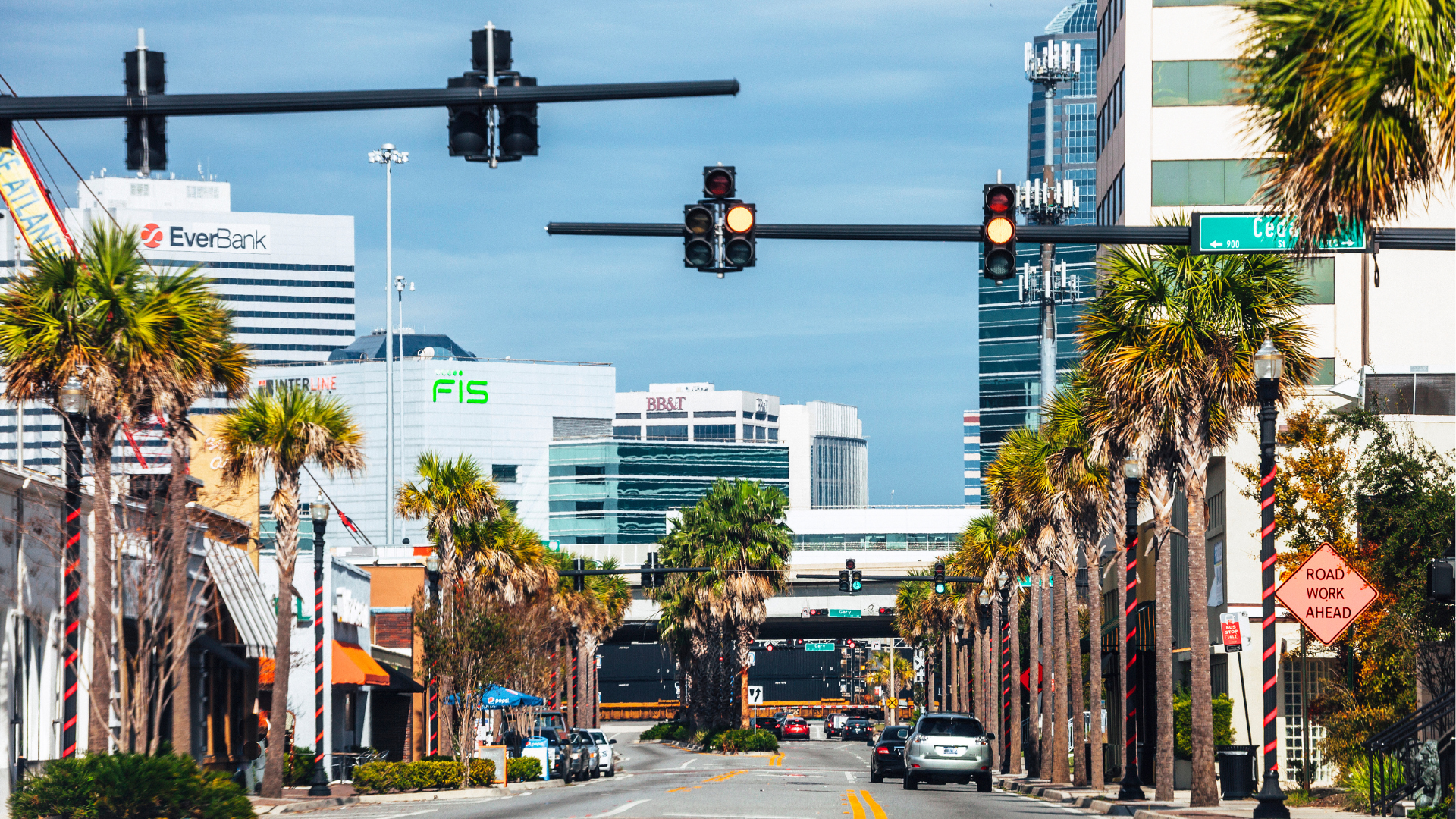Curious about the city of Jacksonville, Florida? This roundup of frequently asked questions breezes through everything from Jacksonville real estate to weekend plans along its 22 miles of beaches, offering quick facts locals swap when friends plan to visit Jacksonville or settle beside the St. Johns River.
Spanning all of Duval County, the largest city by land area in the continental United States, pairs a bustling downtown with barrier-island parks and laid-back beach towns, so there’s plenty to unpack before picking a neighborhood or booking a hotel. Dive in below for a colorful look at weather, jobs, traffic, and every corner that makes Jax tick.
What Is Jacksonville, FL, Known For?
Jacksonville boasts a shoreline that stretches from Atlantic Beach to Jacksonville Beach and on to Neptune Beach, all linked by the St. Johns River and a broad waterway system. That river slices through downtown, giving the urban core its signature skyline plus riverfront parks, kayak launches, and a water taxi ride that feels more adventure than commute. Fifteen minutes away, you can fish off the pier, surf a morning set, or relax with wildlife on one of several barrier island preserves inside Duval County.
Culture tags along. The Jacksonville Jaguars bring NFL energy, while smaller sports venues host minor-league baseball and annual golf events that keep fans busy. The city of Jacksonville maintains a theater district and museums near Hogan Street, and weekend art walks spill onto every square.
In short, the area blends historic streets, new murals, and outdoor activity into one very large Florida playground.
Is Jacksonville, FL, A Good Place To Live?
Most residents will tell you the city offers a roomy lifestyle at a Florida State price point that still feels attainable.
You get beaches, an enormous park network, and neighborhoods that range from urban lofts near the office towers to river cottages along tree-canopied streets in Riverside. Jacksonville’s friendliness shows up in casual “Hey, neighbor” waves at the dog park and local boards that run volunteer cleanups after big events.
Trade-offs exist. Hot summers and afternoon storms mean sunscreen lives in the car, and traffic can snarl on key bridges at rush hour. Still, the ability to paddle a waterway before breakfast or walk to a bar with live music downtown keeps many residents anchored here.
How Expensive Is It To Live In Jacksonville, FL?
Jacksonville’s cost of living sits a little below the U.S. average.
Day-to-day expenses run roughly 6% cheaper than the national average. Housing leads the savings. Redfin showed a $302,000 median sale price in August 2025, well under many coastal Florida markets.
Every day costs follow suit. Groceries and gas stay close to Southeast norms, and Florida’s no-income-tax policy leaves more take-home pay. Utility bills spike in hot summers yet stay moderate year-round thanks to mild winters. Put together, Jacksonville delivers big-city amenities and beach access without big-city price tags.
How’s The Jacksonville Housing Market?
Homes in Jacksonville averaged $302,000 in August 2025 and listings now sit on the market just over five weeks. Rising inventory has nudged the city into a more balanced phase. Buyers can breathe, but sellers still attract solid offers thanks to steady in-migration and a diverse job base.
Property taxes help, too. Duval County’s effective rate hovers near 0.80%, and Florida’s homestead exemption slices the bill for primary residences. Overall, the market feels cooperative rather than cutthroat, offering choices without sky-high carrying costs.
What Are The Best Neighborhoods In Jacksonville, FL?
Riverside and Avondale curve along the St. Johns River with oak-lined streets, restored brick bungalows, and the café-packed Five Points district just minutes from downtown theaters and offices.
Across the water, San Marco’s lion-statue roundabout anchors indie restaurants, wine bars, and a small art-deco theater, blending 1920s homes with modern lofts while keeping I-95 access close. Farther south, Mandarin offers larger lots, riverfront parks, and weekend farmers markets, with the Buckman Bridge linking commuters to major job hubs.
For salt-air living, Jacksonville Beach, Atlantic Beach, and Neptune Beach share boardwalks, surf shops, and taco joints along A1A. Many residents swap cars for bikes or golf carts, and home prices, while higher than inland areas, still come in below those of pricier Florida resort towns.
What Is The Weather Like In Jacksonville, FL?
The climate lands in the humid-subtropical category. Expect hot, breezy summers, short mild winters, and a hurricane season that runs from June to November.
Afternoon storms clear almost as fast as they arrive, leaving paddleboarders and beach runners to resume activity within the hour. Winter lows rarely freeze, so outdoor sport calendars stay busy year-round.
Are There Good Job Opportunities In Jacksonville, FL?
Jacksonville’s economy runs on several sturdy engines. A trio of major hospital systems, including Baptist, UF Health, and Mayo Clinic, draws everyone from ICU nurses to biomedical researchers.
On the riverfront, towering cranes load containers bound for Europe, underscoring the port’s role in logistics alongside I-95 and CSX rail lines. Naval Station Mayport and NAS Jacksonville add thousands of steady military and civilian paychecks, while new fintech startups slip into renovated warehouses near downtown.
According to Bureau of Labor Statistics data from May 2024, the metro’s average hourly wage sits right around the national mark, with tech, finance, and construction jobs pushing a little higher as fresh projects and data centers break ground.
What Are The Schools Like In Jacksonville, FL?
Duval County oversees about 160 public campuses, starting with neighborhood elementaries and stretching to magnets where teens rebuild airplane engines or map coastal ecosystems. District data shows the Class of 2024 graduated at a rate in the mid-80 percent range, with college-readiness inching higher each year.
Residents looking for alternatives often tour free STEM charters, long-standing private schools like Bolles by the river, and post-secondary spots such as Florida State College at Jacksonville or the lakeside University of North Florida.
What Are The Best Things To Do In Jacksonville, FL?
Start with sunrise yoga on the sand, then explore the Jacksonville Zoo, where manatees glide past the glass.
Riverwalk paths lure joggers downtown, and the Riverside Arts Market sets up under the bridge every Saturday with food trucks, live music, and craft stalls. You can tour a maritime museum, catch a matinee at the historic Florida Theatre, or book a hotel stay on the beach for an easy vacation-at-home weekend.
Anglers fish dock lights along the Intracoastal Waterway at night, while golfers tackle championship greens in nearby Ponte Vedra. Craft beer fans hop between bar patios in the urban core. If you need a quick island escape, hop the Mayport ferry to a state park where wildlife sightings range from dolphins to wild hog tracks.
What Are The Best Beaches And Parks In Jacksonville?
Jacksonville Beach anchors the lineup with wide sand, an 830-foot fishing pier, and an easy stroll to taco joints and beach bars. A few blocks north, Neptune Beach feels quieter; locals roll up on cruiser bikes, then linger for sunset as pelicans skim the breakers.
Atlantic Beach adds dune-lined parks and mellow surf, while Kathryn Abbey Hanna Park blends shady bike trails with a family-friendly stretch of shoreline. For true wilderness, Little Talbot Island State Park offers five miles of unspoiled sand dotted with driftwood and the occasional dolphin fin.
From lively boardwalks to raw barrier-island scenery, the city’s coastline serves up a beach for every mood within minutes of downtown.
How Safe Is Jacksonville, FL?
Crime in Jacksonville shifts block by block, with property offenses outnumbering violent incidents and overall rates landing near the middle for large Southeast metros. The Jacksonville Sheriff’s Office posts an interactive map and yearly report so residents can check recent data for any street or neighborhood.
Most locals handle safety with standard city habits such as locking vehicles, leaving porch lights on, and leaning on neighborhood watch groups or community forums for up-to-the-minute insight.
What Should I Know Before Moving To Jacksonville, FL?
First, the area is enormous. A weekend drive from the north county line to the southern island parks covers nearly an hour without traffic. Own a reliable car and factor bridge patterns into daily plans.
Second, coastal living comes with permit rules: if you plan to build a dock or remodel near a flood zone, an application is required, and Jacksonville.gov provides every form and document you will need.
Finally, pack for variety. You might relax on the beach at sunrise, attend an urban theater show after work, and cheer through a night sport event, all in a single day. The mix of shoreline, parkland, and urban squares gives residents endless activity without leaving Duval County.



